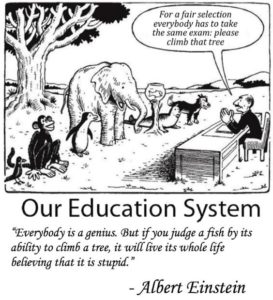
I don’t like to point fingers at the schools because I know there are so many wonderful, caring teachers out there serving our kids and feeling terrible about those that they can’t seem to help, but Einstein’s quote does point out something that we find to be true all of the time at our center:
There are smart, creative, talented kids who feel stupid everyday because school is not working for them.
It’s hard to imagine that Albert Einstein, one of the most brilliant minds of modern times, ever felt stupid. But he was apparently dyslexic, and what I know about our dyslexic students, is that they see the world (and often the page) so differently, that they are very misunderstood, even by themselves.
As the cartoon suggests, we should be more flexible and creative in the ways that we test and have students show what they understand. A dyslexic student who can do a creative project in lieu of a written report will likely stretch and delight the minds of students and teachers, bringing everyone a greater understanding and allowing the student to feel great instead of dumb. I am all for this!
In addition, I have to remind parents and anyone working with students with dyslexia and other learning challenges that while alternate ways of teaching and testing help students be more comfortable in school, they don’t address the underlying issues that are causing the problem.
The creative out-of-the-box thinking that goes along with dyslexia is a real gift and should be nurtured, but the weak ability to process the sounds in words, the confusion with symbols, and disorientation on the page should not. Most diagnosed and undiagnosed learning disabilities including dyslexia can be permanently corrected by identifying and developing the weak underlying learning/processing skills that are at the root of the problem.
Correcting these underlying weaknesses will not take away the brilliant thinking style that our dyslexic learners have. It will just allow them to quit feeling stupid about school.
One of the most dyslexically-challenged students I ever met, had an IEP goal in 3rd grade of learning 9 survival words in a year. Obviously, no one ever expected him to read. Once the underlying roadblocks to learning were eliminated, however, he was able to learn to read and completely exit special education. He graduated high school with honors and went on to pursue his creative talents as a drama major in college.
“Helping smart but struggling students dramatically improve or completely correct their learning and attention challenges by developing the underlying learning skills that are not supporting the learner well enough.”
We serve children and adults with diagnosed or undiagnosed learning and attention challenges including learning disabilities, dyslexia, ADHD, auditory processing disorders, and autism spectrum disorders.
Jill Stowell, M.S.
Author: At Wit’s End A Parent’s Guide to Ending the Struggle, Tears, and Turmoil of Learning Disabilities
Founder and Executive Director – Stowell Learning Centers
Ready to take the next step?
Speak to a Learning Specialist to learn more about the results from students and parents at Stowell Learning Centers.
